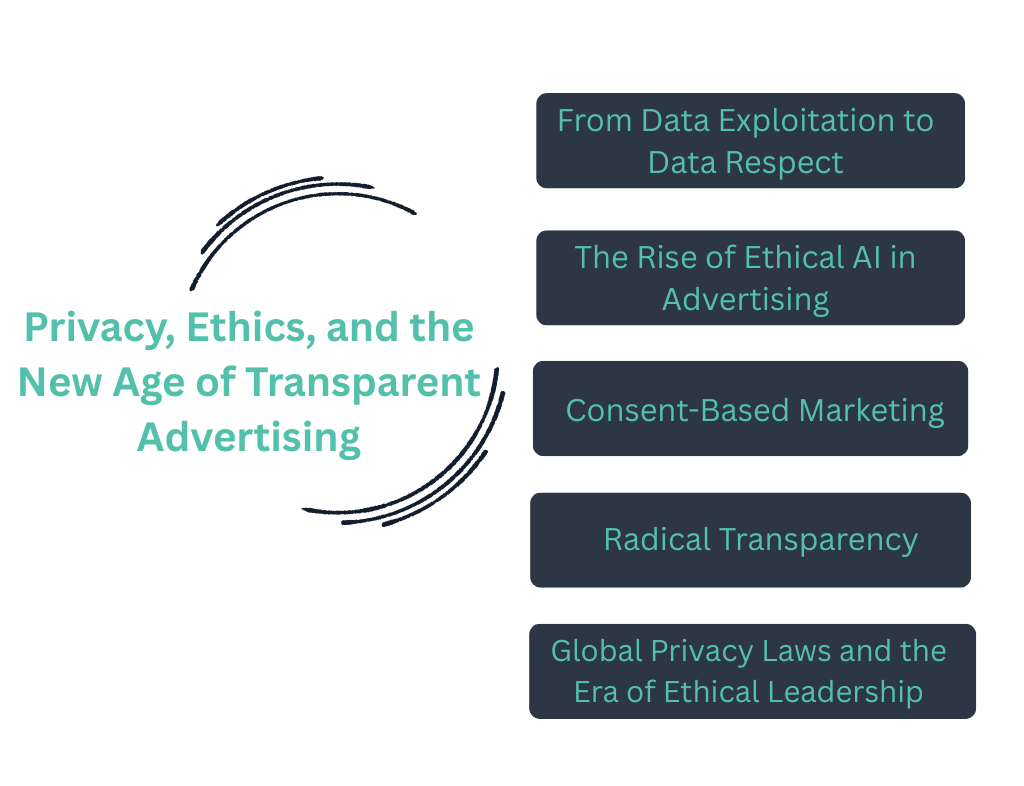In 2025, privacy, ethics, and transparency are no longer optional they are the foundation of modern marketing. Consumers today don’t want to be tracked, manipulated, or targeted in the shadows. What they truly want is respect, honesty, and control over their own data.
This shift has forced brands to evolve. The focus is no longer on collecting massive amounts of user data it’s on building trust, acting responsibly, and creating long term relationships through ethical marketing.
You can also read :Cybersecurity in 2025 Protecting Businesses from Evolving Threats
We’ll explore five major shifts shaping the new era of transparent advertising, how businesses can fix privacy challenges, and why ethics are now at the core of digital success.

From Data Exploitation to Data Respect
For years, digital advertising was built on data exploitation tracking browsing history, collecting location data, and profiling users without their full awareness. While this approach delivered precision targeting, it also eroded consumer trust.
Now, the industry is moving toward a new mindset: data respect. Brands are redefining how they handle information, focusing on consent, relevance, and honesty instead of aggressive data mining.
Respecting data means:
- Asking for permission before collecting it
- Gathering only what’s necessary
- Clearly explaining how and why it’s used
When consumers understand the value exchange sharing data in return for personalized and valuable experiences they become more open and engaged.
The Rise of Ethical AI in Advertising
Artificial Intelligence is now at the heart of advertising from automating campaigns to predicting consumer behavior. However, as AI grows more powerful, it introduces serious ethical challenges.
AI can unintentionally:
- Reinforce bias in ad targeting
- Misuse personal data
- Over personalize to the point of manipulation
To prevent this, marketers must adopt ethical AI practices built on fairness, accountability, and transparency.
That means:
- Ensuring AI decisions are explainable
- Using automation to enhance experience, not manipulate emotions
- Maintaining a human centered approach where technology serves people
When brands use AI responsibly, personalization feels helpful, not invasive and customers appreciate that balance.
Consent Based Marketing
Today’s consumers demand control. They no longer want their data taken silently they want to decide what to share, when, and with whom. This has given rise to consent-based marketing, a model rooted in user permission and transparency.
Instead of relying on hidden trackers, consent-based marketing invites participation. It’s open, honest, and built on trust.
When users voluntarily share data, it’s because they recognize the value exchange whether it’s better product recommendations, exclusive offers, or personalized experiences.
The future of digital advertising lies in preference-driven communication, where users define the kind of ads they want to see. It’s not just ethical it’s more effective.
Radical Transparency
In a digital world overwhelmed by misinformation and data breaches, trust has become marketing’s most valuable currency.
Radical transparency goes beyond legal compliance. It means being completely open about:
- What data you collect
- Why you collect it
- How it benefits users
It also extends to honest communication avoiding manipulative design, deceptive copy, or hidden terms. Transparent brands don’t just tell the truth; they make it easy to understand.
This openness strengthens emotional connections, boosts customer loyalty, and differentiates ethical brands from exploitative ones.
Global Privacy Laws and the Era of Ethical Leadership
The global advertising industry now operates under privacy first regulations such as the GDPR (Europe), CCPA (California), and other regional laws protecting digital rights.
But compliance alone isn’t enough. The most respected brands go beyond the law they set new ethical standards.
Becoming an ethical leader in advertising means:
- Embedding privacy into every campaign decision
- Using secure, transparent data systems
- Building a company culture that values ethics as much as creativity
Ethical leadership isn’t just about doing what’s right it’s a competitive advantage. It helps brands build credibility, anticipate change, and thrive in a trust driven economy.
How to Fix
Many brands recognize the importance of ethics and privacy but struggle to implement them effectively. Here’s how to build a more transparent and trust driven advertising model:
1. Build Privacy into Every Campaign
Adopt a privacy by design mindset. Plan every campaign with privacy in mind from the start. Collect only what’s needed, secure it properly, and anonymize wherever possible.
2. Rely on First-Party Data
As third party cookies disappear, first party data is becoming the ethical backbone of advertising. Collect it directly through surveys, newsletters, and loyalty programs with full consent.
3. Simplify Communication
Avoid long, legal heavy privacy policies. Use plain, human language that your audience can understand. Transparency is about clarity, not complexity.
4. Audit Your Technology Regularly
Review your data systems, algorithms, and ad tech tools to ensure they are inclusive, unbiased, and compliant with privacy regulations.
5. Create a Culture of Ethics
Educate your teams about privacy laws, consumer rights, and ethical advertising standards. When your team understands why ethics matter, they’ll make better decisions naturally.
Conclusion
In 2025, digital advertising is no longer about who has the most data it’s about who has the most trust.
Consumers are more informed, cautious, and empowered than ever. They choose brands that are honest, transparent, and respectful of their privacy. Those that ignore this shift risk losing both credibility and customers.
By embracing privacy, ethics, and transparency, businesses can create stronger relationships, deeper loyalty, and long term growth.
The future of advertising belongs to brands that don’t just sell they respect, empower, and inspire.
FAQs
Why is privacy so important in advertising?
Privacy builds trust. When people know their data is handled responsibly, they feel confident engaging with your brand.
What does ethical advertising mean?
Ethical advertising means creating transparent, honest, and respectful campaigns that inform rather than manipulate audiences.
How can brands make their advertising more transparent?
By explaining clearly why ads appear, simplifying policies, and giving users control over their privacy preferences.
How does AI impact advertising ethics?
AI improves personalization but must be monitored for fairness. Ethical AI ensures every automated decision is transparent and unbiased.
How can small businesses stay compliant with privacy laws?
Start small use clear consent forms, basic privacy policies, and secure storage. Even simple steps show responsibility and build credibility.

